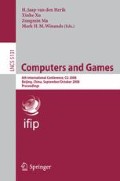Abstract
By developing an intelligent computer system that will provide commentary of chess moves in a comprehensible, user-friendly, and instructive way, we are trying to use the power demonstrated by the current chess engines for tutoring chess and for annotating chess games. In this paper, we point out certain differences between the computer programs which are specialized for playing chess and our program which is aimed at providing quality commentary. Through a case study, we present an application of argument-based machine learning, which combines the techniques of machine learning and expert knowledge, to the construction of more complex positional features, in order to provide our annotating system with an ability to comment on various positional intricacies of positions in the game of chess.
Access this chapter
Tax calculation will be finalised at checkout
Purchases are for personal use only
Preview
Unable to display preview. Download preview PDF.
References
Clark, P., Boswell, R.: Rule induction with CN2: Some recent improvements. In: Kodratoff, Y. (ed.) EWSL 1991. LNCS, vol. 482, pp. 151–163. Springer, Heidelberg (1991)
Možina, M., Žabkar, J., Bratko, I.: Argument based machine learning. Artificial Intelligence 171(10/15), 922–937 (2007)
Nimzovich, A.: The Blockade. Republished by Hardinge Simpole Limited (2006)
Prakken, H., Vreeswijk, G.: Handbook of Philosophical Logic. In: chapter Logics for Defeasible Argumentation, 2nd edn., vol. 4, pp. 218–319. Kluwer Academic Publishers, Dordrecht (2002)
Sadikov, A., Možina, M., Guid, M., Krivec, J., Bratko, I.: Automated chess tutor. In: van den Herik, H.J., Ciancarini, P., Donkers, H.H.L.M(J.) (eds.) CG 2006. LNCS, vol. 4630, pp. 13–25. Springer, Heidelberg (2006)
Watson, J.: Secrets of Modern Chess Strategy. Gambit Publications (1999)
Author information
Authors and Affiliations
Editor information
Rights and permissions
Copyright information
© 2008 Springer-Verlag Berlin Heidelberg
About this paper
Cite this paper
Guid, M., Možina, M., Krivec, J., Sadikov, A., Bratko, I. (2008). Learning Positional Features for Annotating Chess Games: A Case Study. In: van den Herik, H.J., Xu, X., Ma, Z., Winands, M.H.M. (eds) Computers and Games. CG 2008. Lecture Notes in Computer Science, vol 5131. Springer, Berlin, Heidelberg. https://doi.org/10.1007/978-3-540-87608-3_18
Download citation
DOI: https://doi.org/10.1007/978-3-540-87608-3_18
Publisher Name: Springer, Berlin, Heidelberg
Print ISBN: 978-3-540-87607-6
Online ISBN: 978-3-540-87608-3
eBook Packages: Computer ScienceComputer Science (R0)

